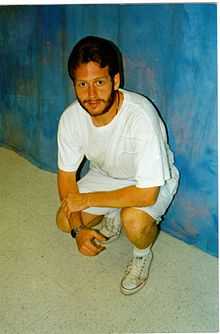Timothy L. Tyler
Timothy Leonard Tyler (born 1968) is an American serving life in prison for possession and distribution of LSD.

Background
Tyler was raised in Connecticut and Florida, where he attended Lakewood Senior High School, graduating in 1986. His parents were divorced and he was physically and emotionally abused by his stepfather. He suffered from depression as a child. He had episodes that resulted in at least six emergency mental health hospitalizations.[1][2][3]
After graduation, he toured the country attending Grateful Dead concerts. He sold fried dough, fruit smoothies, beer and sodas. He consumed and sold marijuana and LSD. He was first arrested in Panama City, Florida for LSD possession and released on his own recognizance. A second arrest occurred that resulted in three years of probation. Tyler resumed touring with the Grateful Dead and sent LSD to a friend who was arrested for marijuana possession who turned into a confidential informant for the DEA.[1][4] During a two-month period, this confidential informant, working with the DEA, asked Tyler to mail him LSD five times, which Tyler did. Tyler sent the package to his father's address, implicating him.[2]
Sentencing
According to a pre-sentencing memorandum, Tyler was charged with selling 13,045 hits of acid, found on 13 sheets of paper and equivalent to several grams of liquid. Tyler pled guilty to drug distribution. Tyler netted about $3,000 from "a very loosely woven conspiracy" that involved selling acid to "friends, family and business acquaintances," according to the memo prepared by his probation officer.[2]
In 1992, at age 24, he was sentenced to life in prison without parole because his two prior drug convictions (for which he did not serve prison time) triggered the federal three-strikes law.[2][3] The judge could not consider Tyler’s drug addiction, lack of violent conduct, mental health issues, or youth when sentencing.
As part of the conspiracy, Tyler's father received a ten-year sentence and died in prison.[3] His friend who worked as a confidential informant served ten years.[2][4]
Life in prison
Tyler is currently incarcerated in United States Penitentiary, Canaan in Pennsylvania. Because of prison prohibitions against music, Tyler went 20 years from the time of his initial arrest without listening to any Grateful Dead music, except what his sister could play for him in the limited phone time he was allocated. In 2012, inmates were permitted to purchase digital music players.[2][3]
Tyler's family hopes that he will some day be eligible for compassionate release, a program that allows some inmates to leave prison before their sentences have been fully served if they are elderly or sick.[2][3]
Tyler, who had girlfriends before his incarceration, now identifies as bisexual; he began to engage in sexual activity with men while in prison in search of companionship.[2][3] Tyler pitches on a prison softball team, the Yankees, and plays handball.[3]
In 2013, Senator Rand Paul has highlighted Tyler's case, writing that he "should have been punished for selling drugs, but he shouldn’t have to spend the rest of his life in prison for it. Today, Timothy is 45 and will likely spend the rest of his life behind bars, not because a judge thought it was a proper punishment, but because an arbitrary federal law demanded it."[5]
References
- ↑ 1.0 1.1 "Tim's Story". Drug War Prisoners. Retrieved 7 November 2013.
- ↑ 2.0 2.1 2.2 2.3 2.4 2.5 2.6 2.7 Silvestrini, Elaine (2013-07-29). "Mandatory minimums keep many nonviolent people behind bars". Tampa Tribute. Retrieved 2013-11-14.
- ↑ 3.0 3.1 3.2 3.3 3.4 3.5 3.6 Fuchs, Erin (2013-07-29). "The Heartbreaking Story Of A Harmless Deadhead Sentenced To Die In Prison". Business Insider. Retrieved 2013-11-14.
- ↑ 4.0 4.1 Gill, Molly (2013-02-15). "Op-Ed: Snitching Shouldn't Be Required for a Fair Sentence". Takepart.com. Retrieved 2013-11-14.
- ↑ Paul, Rand (2013-08-16). "PAUL: The madness of mandatory minimums". The Washington Times. Retrieved 2013-11-14.